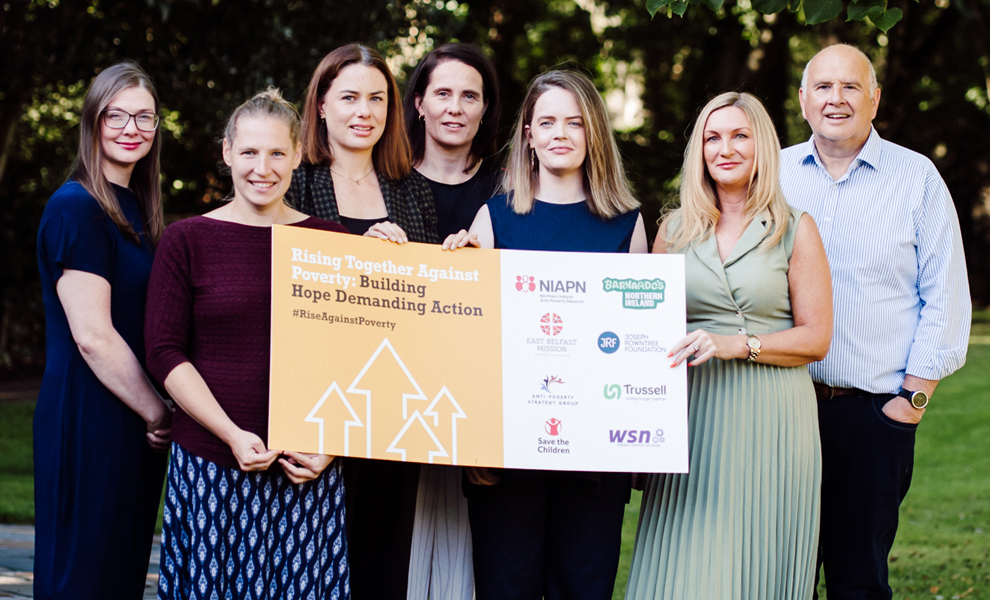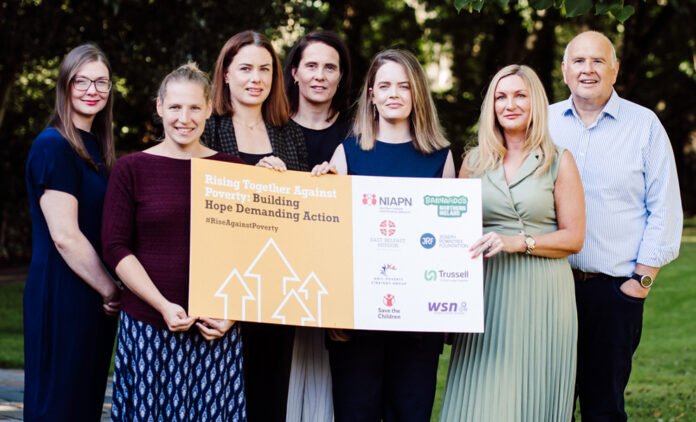 Fiona Cole, Trussell; left, with Becca Bor, NIAPN; Sheena McMullen, JRF; Siobhán Harding, Women’s Support Network; Trása Canavan, Barnardo’s NI; Laura Feeney, Save the Children; Brian Anderson, East Belfast Mission.
Fiona Cole, Trussell; left, with Becca Bor, NIAPN; Sheena McMullen, JRF; Siobhán Harding, Women’s Support Network; Trása Canavan, Barnardo’s NI; Laura Feeney, Save the Children; Brian Anderson, East Belfast Mission.
A conference yesterday heard calls for the Northern Ireland Executive to withdraw its ‘harmful’ and not ‘fit for purpose’ draft Anti-Poverty Strategy.
Organisers, including the Anti-Poverty Strategy Group, Barnardo’s NI, Trussell, the Northern Ireland Anti-Poverty Network, Women’s Support Network and Save the Children, have issued a final plea to the Northern Ireland Executive to withdraw its Anti-Poverty Strategy, which was published in June and rejected by more than 50 groups who branded it “harmful” to families and communities.
They have called on the Executive to instead commit to addressing six key outcomes tackling poverty in Northern Ireland which were outlined by the Anti-Poverty Strategy Group in a 100-page document compiled by experts working alongside government in 2021. The group says its recommendations have been ignored resulting in a draft strategy without targets or resource.
The event, at the Dunadry Hotel in County Antrim took place ahead of the deadline for the public to respond to the Executive’s draft strategy on September 19.
‘The draft Anti-Poverty Strategy does not deliver economic and social protection for anyone and does nothing to address poverty in any real way’
Attendees also took part in a range of workshops exploring key aspects of poverty, including Cash First initiatives, unpaid care and using the law to hold government to account. The event also featured a powerful panel of campaigners with lived experience, who shared their insights and perspectives on what real change could look like.
Trása Canavan, Barnardo’s Senior Policy and Public Affairs Lead for Northern Ireland and Chair of the Anti-Poverty Strategy Group, which represents over 20 organisations across Northern Ireland, said: “Today’s event is about coming together as a sector to transform the disappointment we all feel about the government’s approach into determination, to make a positive change for society.
“It is unacceptable that in 2025 children in Northern Ireland are still growing up in poverty, which can affect their physical and mental health long into adulthood.”
Ms Canavan said that an Anti-Poverty Strategy for Northern Ireland presented a “vital opportunity” to address societal challenges, but civil society organisations believed the government’s draft “isn’t fit for purpose” as groups across the region outlined in a letter to Executive Ministers in late June.
She added: “It’s incredibly frustrating because experts have worked with the government making key, evidence-based recommendations for years, but they have been ignored and sidelined.”
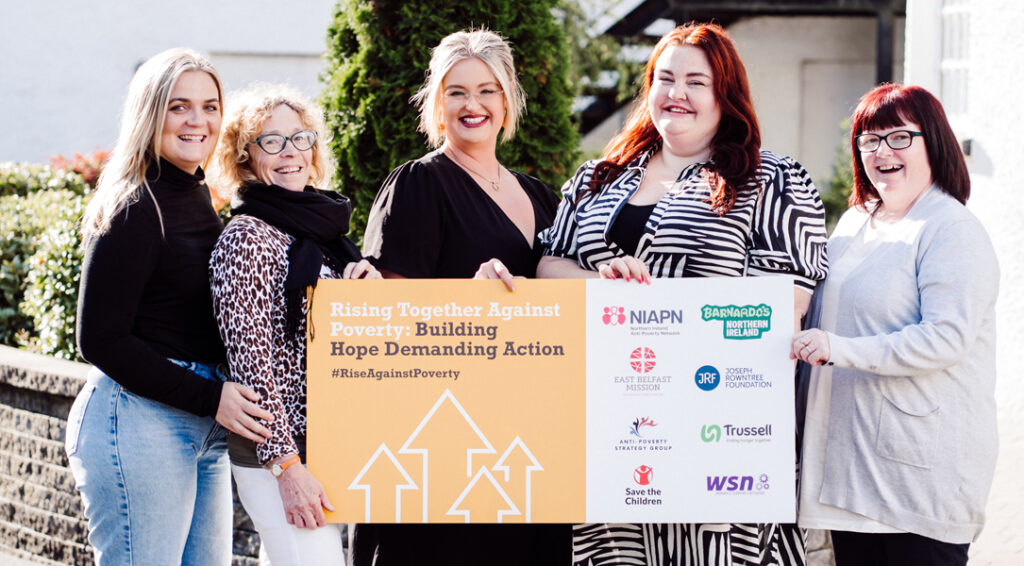 Anti-poverty campaigners: Jenni Lindsay, Nuala Crilly, Rachel Benson, Lauren Entwistle and Michelle Clancy
Anti-poverty campaigners: Jenni Lindsay, Nuala Crilly, Rachel Benson, Lauren Entwistle and Michelle Clancy
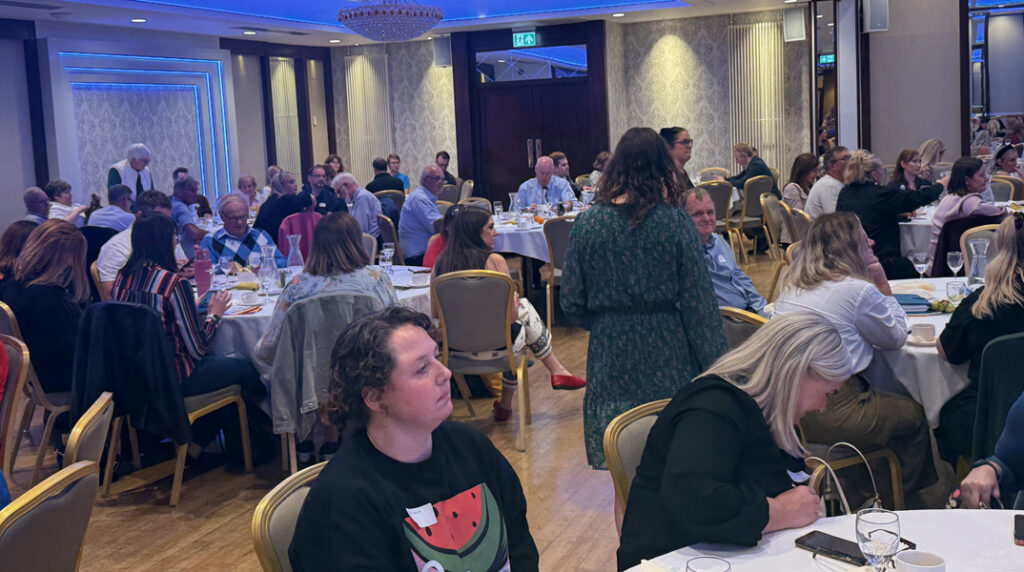 Packed Rising Against Poverty conference at the Dunadry Hotel
Packed Rising Against Poverty conference at the Dunadry Hotel
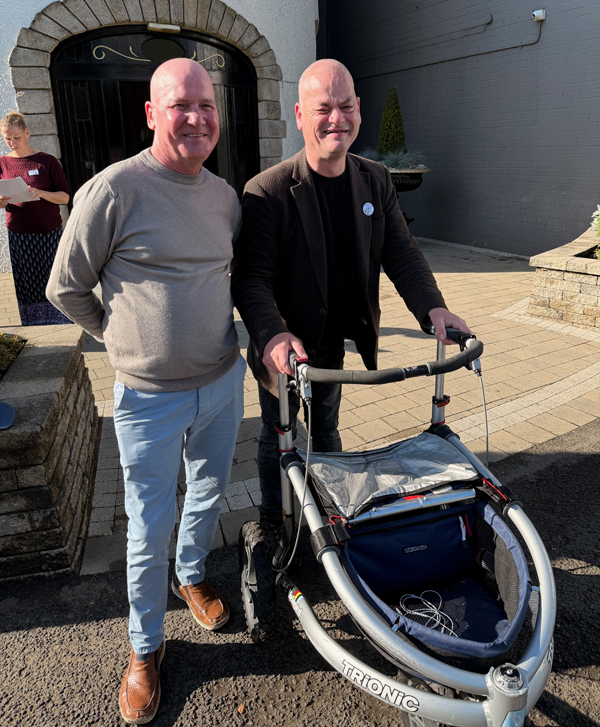 Anti-poverty campaigner Tony O’Reilly, right, with Paul
Anti-poverty campaigner Tony O’Reilly, right, with Paul
Tony O’Reilly, a member of the Northwest Forum of People with Disabilities (NWFPWD’s) Management Committee, said: “If disabled people don’t have economic and social protection, we cannot enjoy any of the human rights to which we are entitled. The draft Anti-Poverty Strategy does not deliver economic and social protection for anyone and does nothing to address poverty in any real way. It would be better that this form of a Strategy didn’t exist, it’s just words on a page that won’t achieve anything. To be honest, it’s offensive.”
Keynote speaker, Fiona King, policy lead for Save the Children in Scotland, said: “Making political choices to invest in children and families works and it benefits us all. The most recent child poverty figures for Scotland were evidence of this. Social security-based policies like the Scottish Child Payment meant that child poverty fell by four percentage points in Scotland over the past year but rose or stayed stagnant in every other part of the UK.
“We’re going in the right direction in Scotland, but we need to travel much more quickly. Far too many children are still being held back by poverty from fulfilling their potential. We’ve seen what’s possible when we choose to invest in childhoods.
“Politicians from all parties must work together for a better future for children and take the bold action we know the public wants to see on child poverty.”
